Justice Jackson Recused Herself From a Supreme Court Case. Your Move, Clarence Thomas!
Justice Ketanji Brown Jackson stepped out due to a potential conflict of interest. Anyone else feel the need to do that on any subject? No?
Politics

Today, the Supreme Court is hearing arguments that will likely result in its overturning of affirmative action in education. The plaintiffs allege that race-conscious school admissions are a form of discrimination against White and Asian students. It’s bad! But there are actually two separate arguments today about the constitutionality about affirmative action, because Justice Ketanji Brown Jackson recused herself from one due to a potential conflict of interest. Justice Clarence Thomas is seeing this, right?
Conservative activist Ed Blum is challenging the race-conscious admission policies at the University of North Carolina and Harvard University via his group Students for Fair Admissions. Justice Jackson attended Harvard and served for six years on its board, and she will not participate in the argument about Harvard; the arguments were previously grouped together, but today the court is hearing them separately.
-

-

-

-

-

-

-

-

-

-

-

-

-

-

-

-

-

-

-

-

-

-

-

-

-

-

-

-

-

-

-

-

-

-

-

-

-

-

-

-









































